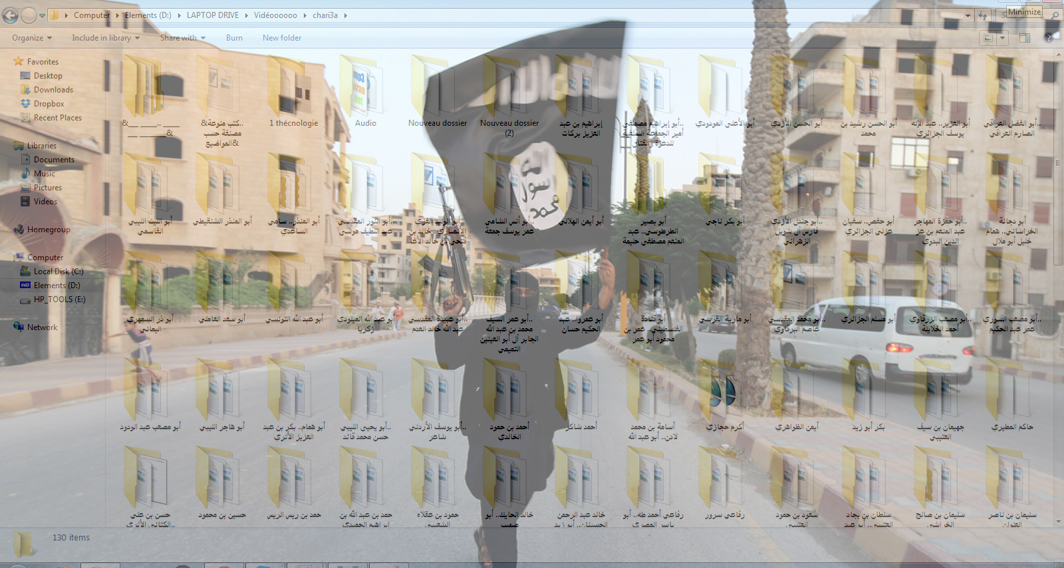Does laptop prove Islamic State wants a dirty bomb?
A laptop with details of how to build a dirty bomb has been found in Syria. One expert tells Channel 4 News that such an attack could be “easier than flying a plane into a tall building”.

A laptop belonging to an alleged Islamic State fighter, containing a 19-page document about how to weaponise the bubonic plague and develop biological weapons, has been found in Syria, according to journalists for Arabic station Al Aan TV who have seen the files.
Channel 4 News has been unable to independently verify the origin and contents of the laptop.
But experts have told Channel 4 News that they are worried and that distributing such a weapon could be easier than undertaking a 9/11 style attack.
Professor Brendan Wren, an expert in infectious diseases at the London School of Hygiene & Tropical Medicine, says: “Without doubt it is a cause for concern.
“Without over-dramatising it myself, it is easier to culture yersinia pestis or bacillus anthracis from a sick animal, grow it up and distribute it in a crowded area than it is to fly an aeroplane into a tall building. We have to be ever vigilant and prepared.”
Left in a village
The laptop was handed to journalists Harald Doornbos and Jenan Moussa at Arabic television station Al Aan TV by Abu Ali, a commander of a moderate rebel group in Syria.
The Dell-model computer was left in a village close to the Turkish border, after the village was attacked by the rebels.
“We found the laptop and the power cord in a room. I took it with me. But I have no clue if it still works or if it contains anything interesting,” a rebel commander told the journalists.
Journalists made a copy of the hard disk and claim that the laptop had 146 gigabytes of material hidden on the device, without any password protection.
Biological weapons
While most of the documents centre on ideological justification for jihad, there is also information about how to build a biological weapon.
One document in particular explains how to test a biological weapon, and its advantages.
“The advantage of biological weapons is that they do not cost a lot of money, while the human casualties can be huge”, the document states.
“When the microbe is injected in small mice, the symptoms of the disease should start to appear within 24 hours.”
The laptop is said to belong to a Tunisian national fighting with Islamic State who studied physics and chemistry at two Tunisian universities.
Maximum harm
The UK threat level was today raised to severe in response to fears of Islamic State terrorism attacks.
Professor Brendan Wren said: “It is quite easy to distribute bacteria as they can survive well (e.g. bacillus anthracis spores will survive in the post).
“Manufacturing them to cause maximum harm (weaponising them) is more difficult and requires specialised knowledge. They would also have to be optimally distributed to have maximum impact.
“The pathogens are found in the natural environment – e.g. Ebola virus in West Africa, or yersinia pestis, the bacterium that causes plague, is found naturally in many parts of the world including the western US. They are already dangerous and can be cultured and grown in large amounts, potentially for nefarious purposes.
“I’m not actually convinced that yersinia pestis is naturally found in Syria. It is in Kazakhstan and China. However, to culture bacteria such yersinia pestis in large amounts is not too difficult or expensive.”
Fatwa on WMDs
A 26-page fatwa document on the laptop argues that it is permissible to use weapons of mass destruction against unbelievers. The fatwa was written by imprisoned Saudi cleric Nasir-al-Fahd.
“If Muslims cannot defeat the kafir [unbelievers] in a different way, it is permissible to use weapons of mass destruction. Even if it kills all of them and wipes them and their descendants off the face of the earth,” the document reads.
There is no indication that IS has the means, the technical ability or the components to build such a weapon.
But Magnus Ranstorp, research director at the Center for Asymmetric Threat Studies (CATS) at the Swedish National Defence College, told Al Aan TV that while IS may not be able to get its hands on the bubonic plague, there is cause for concern.
“I think we should be worried. It seems they have the scientific capability within their ranks.
“You don’t need a lot of scientific expertise to be able to cultivate a certain biological agent or toxin. The real difficulty is to weaponise them, to have a workable distribution system that will kill a lot of people.
“The document mentions Botulinum toxin which are difficult to cultivate and have been very difficult to weaponise.”
While one document on the IS laptop explains how to build biological weapons, another explains how to bake a cake.